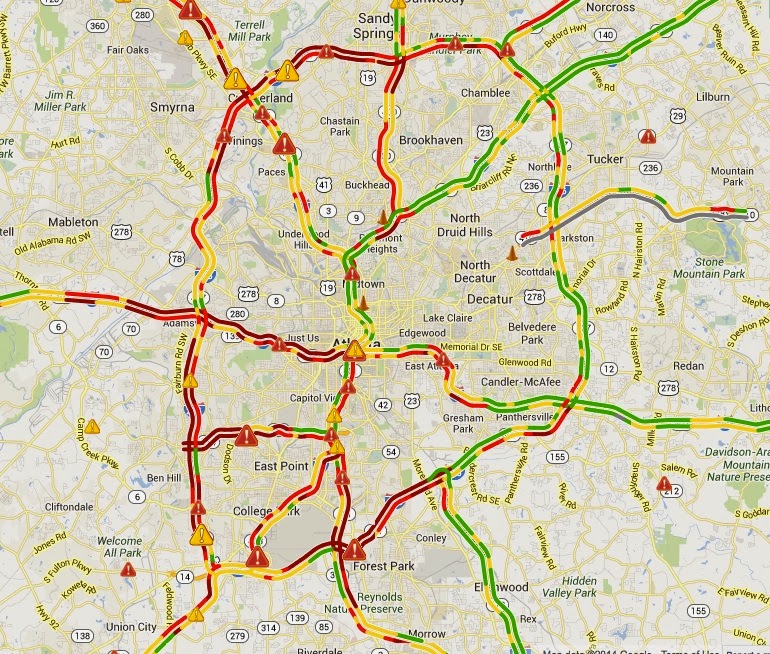For those of you who've been hiding in wireless-free caves, it snowed 2.7 inches yesterday in Atlanta and an epic traffic jam ensued. Meaning motorists were stranded on highways for 6, 7, 14, 18, 20, now 24 hours. The big problem was that it did this in the middle of a week day, but I'm getting ahead of myself. To fully understand what happened here, you must take into account all the times local municipalities, counties, and (most particularly) school systems have been criticized for shutting down for anticipated events that never materialized.
 |
| Radar around noon on Tuesday, January 28, 2014 |
There are two asides that complicated things:
The TRUCKS. If you've been watching this full time like I have, it's impossible not to notice the tractor trailer trucks, which were a huge part of the clog (literally and figuratively). When they slide, they jack-knife, and block the whole damn road. Is there a way to close Atlanta to truck traffic and how would it be enforced? Governor Deal suggests requiring truckers to use tire chains when entering the city during a snow event. This is something that can be done at weigh stations and might have made a big difference.
The POULTRY PEOPLE. The International Poultry Expo (IPE) is in town, and there's not a hotel room to be found, anywhere. Which brings us to the comparisons. Everybody stop talking about the 2011 snow and ice event. Now. It's not relevant. This is nothing like that. This was much more like SnowJam 1982, and in 1982 folks abandoned their vehicles all over the place and walked. We had fewer people and fewer highways, so it was a little less dramatic; but the same thing happened then, but without the IPE. Thousands of people stranded in one or another of the city's many business districts just walked. Some of them walked to a friend's house, some of them walked to the nearest bar, some of them walked home; but many of them walked to and checked in at the nearest hotel. This time there was no room at the inn.
Obviously, in retrospect, the state, the city and the school systems should not have all shut down and sent folks home at the same time. That was a mistake. They should have been staggered, starting with not sending the kids to school to begin with. It's the thing that can be done with the least loss in the event it's a false alarm. If there's any public entity that should be skewered here, it's the school systems, and there are a lot of them. Is there some kind of system via which they talk to each other? I'm sure I won't get them all, but these governing entities include Atlanta Public Schools, DeKalb County Schools, Fulton County Schools, Gwinnett County Schools, Clayton County Schools, Cobb County Schools, Decatur City Schools, Marietta City Schools, you get the idea. Perhaps what we need is an organized entity that shares information across those school districts. Maybe if they had a chance to talk through it with each other, they would have reached a better decision.
 |
| Day 2 - January 29, 2014 at 14:00 |
Way back in the olden days when I was in my twenties, I worked at MississippiRiverLand Air Lines (not its real name). We used to do recurrent training every year. We'd watch films about crashes and study NTSB reports, and after a while a pattern became obvious: it was never just one thing that caused those disasters. It was always a combination of things. Malcolm Gladwell wrote about the same phenomenon in his book, Outliers. This is like that. It was a big combination of a lot of little things: the previous false alarms, the waffling forecasts, the lack of hotel rooms, everyone leaving work and school at the same time, all those big trucks on the road, when combined with the falling snow and temps, created a gridlock so intense that rescuers couldn't get through anywhere to help.
 |
| I-285 north of Atlanta on Day 2, January 29, 2013 |
Update: At 18:00 day two, local news reports that there are no longer students stuck at schools or on buses.